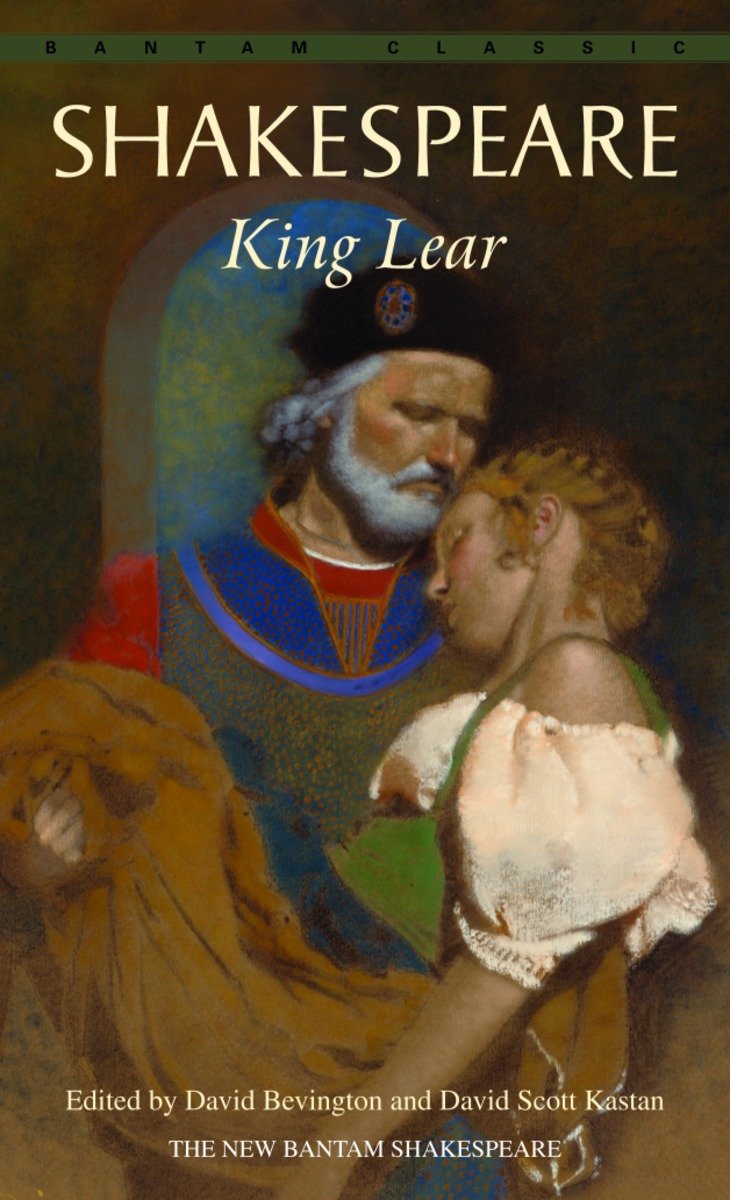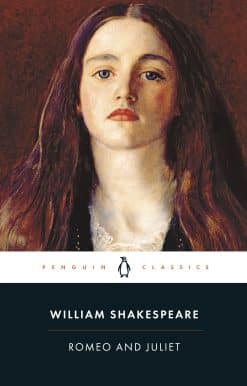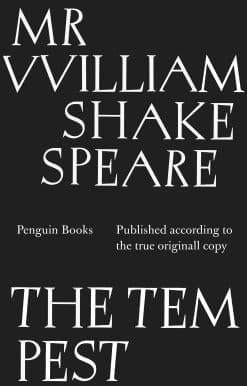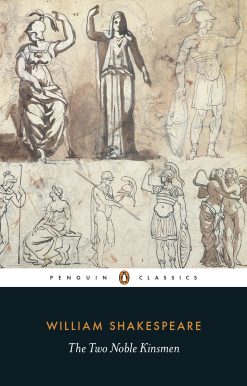Description
A king foolishly divides his kingdom between his scheming two oldest daughters and estranges himself from the daughter who loves him. So begins this profoundly moving and disturbing tragedy that, perhaps more than any other work in literature, challenges the notion of a coherent and just universe. The king and others pay dearly for their shortcomings–as madness, murder, and the anguish of insight and forgiveness that arrive too late combine to make this an all-embracing tragedy of evil and suffering.Each Edition Includes:• Comprehensive explanatory notes • Vivid introductions and the most up-to-date scholarship • Clear, modernized spelling and punctuation, enabling contemporary readers to understand the Elizabethan English• Completely updated, detailed bibliographies and performance histories • An interpretive essay on film adaptations of the play, along with an extensive filmography
Additional information
| Weight | 0.198625 kg |
|---|---|
| Dimensions | 2.2606 × 10.6426 × 17.018 cm |
| Author(s) | |
| Format Old` | |
| Language | |
| Publisher | |
| Year Published | 1988-1-1 |
| Imprint | |
| Publication City/Country | USA |
| ISBN 10 | 0553212974 |
| About The Author | William Shakespeare was born in Stratford-upon-Avon in April 1564, and his birth is traditionally celebrated on April 23. The facts of his life, known from surviving documents, are sparse. He was one of eight children born to John Shakespeare, a merchant of some standing in his community. William probably went to the King’s New School in Stratford, but he had no university education. In November 1582, at the age of eighteen, he married Anne Hathaway, eight years his senior, who was pregnant with their first child, Susanna. She was born on May 26, 1583. Twins, a boy, Hamnet ( who would die at age eleven), and a girl, Judith, were born in 1585. By 1592 Shakespeare had gone to London working as an actor and already known as a playwright. A rival dramatist, Robert Greene, referred to him as “an upstart crow, beautified with our feathers.” Shakespeare became a principal shareholder and playwright of the successful acting troupe, the Lord Chamberlain’s Men (later under James I, called the King’s Men). In 1599 the Lord Chamberlain’s Men built and occupied the Globe Theater in Southwark near the Thames River. Here many of Shakespeare’s plays were performed by the most famous actors of his time, including Richard Burbage, Will Kempe, and Robert Armin. In addition to his 37 plays, Shakespeare had a hand in others, including Sir Thomas More and The Two Noble Kinsmen, and he wrote poems, including Venus and Adonis and The Rape of Lucrece. His 154 sonnets were published, probably without his authorization, in 1609. In 1611 or 1612 he gave up his lodgings in London and devoted more and more time to retirement in Stratford, though he continued writing such plays as The Tempest and Henry VII until about 1613. He died on April 23 1616, and was buried in Holy Trinity Church, Stratford. No collected edition of his plays was published during his life-time, but in 1623 two members of his acting company, John Heminges and Henry Condell, put together the great collection now called the First Folio. |
| Excerpt From Book | [Dramatis PersonaeKING LEARGONERIL,REGAN, Lear's daughtersCORDELLA,DUKE OF ALBANY, Goneril's husbandDUKE OF CORNWALL, Regan's husbandKING OF FRANCE, Cordelia's suitor and husbandDUKE OF BURGUNDY, suitor to CordeliaEARL OF KENT, later disguised as CaiusEARL OF GLOUCESTEREDGER, Gloucester's son and heir, later disguised as poor TomEDMUND, Gloucester's bastard sonOSWALD, Goneril's stewardA KNIGHT serving King LearLear's foolCURAN, in Gloucester's householdGENTLEMENThree servantsold man, a tenant of GloucesterThree MESSENGERSA GENTLEMEN attending Cordelia as a DoctorTwo captainsHERALDKnights, Gentlemen, Attendants, Servants, Officers, Soldiers, Trumpetersscene: Britain]1.1. Location: King Lear's palace.1 affected favored2 Albany i.e., Scotland5-7 equalities . . . moiety the shares balance so equally that close scrutiny cannot find advantage in either's portion.9 breeding raising, care. charge expense.11 brazed hardened12 conceive understand. (But Gloucester puns in the sense of "become pregnant.")16 fault (1) sin (2) loss of scent by the hounds.17 issue (1) result (2) offspring18 proper (1) excellent (2) handsome.19 by order of law legitimate19-20 some year about a year20-1 account estimation.21 knave young fellow. (Not said disapprovingly, though the word is ironic.). something somewhat24 whoreson low fellow; suggesting bastardy, but (like knave above) used with affectionate condescension[1.1] A Enter Kent, Gloucester, and Edmund.KENT I thought the King had more affected the Duke of 1Albany than Cornwall. 2GLOUCESTER It did always seem so to us; but now inthe division of the kingdom it appears not which ofthe dukes he values most, for equalities are so weighed 5that curiosity in neither can make choice of either's 6moiety. 7KENT Is not this your son, my lord?GLOUCESTER His breeding, sir, hath been at my charge. 9I have so often blushed to acknowledge him that nowI am brazed to't. 11KENT I cannot conceive you. 12GLOUCESTER Sir, this young fellow's mother could;whereupon she grew round-wombed and had indeed,sir, a son for her cradle ere she had a husbandfor her bed. Do you smell a fault? 16KENT I cannot wish the fault undone, the issue of it 17being so proper. 18GLOUCESTER But I have a son, sir, by order of law, some 19year elder than this, who yet is no dearer in my ac- 20count. Though this knave came something saucily to 21the world before he was sent for, yet was his motherfair, there was good sport at his making, and thewhoreson must be acknowledged.–Do you know this 24noble gentleman, Edmund?EDMUND No, my lord.GLOUCESTER My lord of Kent. Remember him hereafteras my honorable friend.29 services duty30 sue petition, beg31 study deserving strive to be worthy (of your esteem).32 out i.e., abroad, absent33.1 Sennet trumpet signal heralding a procession.. one . . . then (This direction is from the Quarto. The coronet is perhaps intended for Cordelia or her betrothed. A coronet signifies nobility below the rank of king.)34 Attend wait upon, usher ceremoniously36 we, our (The royal plural; also in lines 37-44, etc.). darker purpose undeclared intention.38 fast firm43 constant . . . publish firm resolve to proclaim44 several individual50 Interest of right or title to, possession ofEDMUND My services to Your Lordship. 29KENT I must love you, and sue to know you better. 30EDMUND Sir, I shall study deserving. 31GLOUCESTER He hath been out nine years, and away 32he shall again. The King is coming. 33Sennet. Enter [one bearing a coronet, then] KingLear, Cornwall, Albany, Goneril, Regan, Cordelia, and attendants.LEARAttend the lords of France and Burgundy, Gloucester. 34GLOUCESTER I shall, my liege. Exit.LEARMeantime we shall express our darker purpose. 36Give me the map there. [He takes a map.] Know that we have dividedIn three our kingdom; and 'tis our fast intent 38To shake all cares and business from our age,Conferring them on younger strengths while weUnburdened crawl toward death. Our son of Cornwall,And you, our no less loving son of Albany,We have this hour a constant will to publish 43Our daughters' several dowers, that future strife 44May be prevented now. The princes, France and Burgundy,Great rivals in our youngest daughter's love,Long in our court have made their amorous sojournAnd here are to be answered. Tell me, my daughters–Since now we will divest us both of rule,Interest of territory, cares of state– 50Which of you shall we say doth love us most,That we our largest bounty may extend53 Where . . . challenge where both natural affection and merit claim our bounty as its due.56 space, and liberty possession of land, and freedom of action59 found i.e., found himself to be loved60 breath . . . unable utterance impoverished and speech inadequate.64 shadowy shady.. champains riched fertile plains65 plenteous . . . meads abundant rivers bordered with wide meadows69 that self mettle that same spirited temperament70 prize . . . worth value myself as her equal (in love for you). (Prize suggests "price.")71 names . . . love describes my love in action72 that in that74 Which . . . possesses which the most delicately sensitive part of my nature can enjoy75 felicitate made happy78 ponderous weighty81 validity value.. pleasure pleasing featuresWhere nature doth with merit challenge? Goneril, 53Our eldest born, speak first.GONERILSir, I love you more than words can wield the matter,Dearer than eyesight, space, and liberty, 56Beyond what can be valued, rich or rare,No less than life, with grace, health, beauty, honor;As much as child e'er loved, or father found; 59A love that makes breath poor and speech unable. 60Beyond all manner of so much I love you.CORDELIA [aside]What shall Cordelia speak? Love and be silent.LEAR [indicating on map]Of all these bounds, even from this line to this,With shadowy forests and with champains riched, 64With plenteous rivers and wide-skirted meads, 65We make thee lady. To thine and Albany's issueBe this perpetual.–What says our second daughter,Our dearest Regan, wife of Cornwall? Speak.REGANI am made of that self mettle as my sister, 69And prize me at her worth. In my true heart 70I find she names my very deed of love; 71Only she comes too short, that I profess 72Myself an enemy to all other joysWhich the most precious square of sense possesses, 74And find I am alone felicitate 75In your dear Highness' love.CORDELIA [aside] Then poor Cordelia!And yet not so, since I am sure my love'sMore ponderous than my tongue. 78LEARTo thee and thine hereditary everRemain this ample third of our fair kingdom,No less in space, validity, and pleasure 8183 least youngest84 vines vineyards. milk pastures (?)85 be interessed be affiliated, establish a claim, be admitted as to a privilege. draw win93 bond filial obligation97 right fit proper and fitting100 all exclusively, and with all of themselves.. Haply Perhaps, with luck101 plight pledge in marriageThan that conferred on Goneril.–Now, our joy,Although our last and least, to whose young love 83The vines of France and milk of Burgundy 84Strive to be interessed, what can you say to draw 85A third more opulent than your sisters'? Speak.CORDELIA Nothing, my lord.LEAR Nothing?CORDELLA Nothing.LEARNothing will come of nothing. Speak again.CORDELIAUnhappy that I am, I cannot heaveMy heart into my mouth. I love Your MajestyAccording to my bond, no more nor less. 93LEARHow, how, Cordelia? Mend your speech a little,Lest you may mar your fortunes.CORDELIA Good my lord,You have begot me, bred me, loved me. IReturn those duties back as are right fit, 97Obey you, love you, and most honor you.Why have my sisters husbands if they sayThey love you all? Haply, when I shall wed, 100That lord whose hand must take my plight shall carry 101Half my love with him, half my care and duty.Sure I shall never marry like my sisters,To love my father all.LEARBut goes thy heart with this?CORDELIA Ay, my good lord.LEAR So young, and so untender?CORDELIA So young, my lord, and true.LEARLet it be so! Thy truth then be thy dower!110 mysteries secret rites.. Hecate goddess of witchcraft and the moon111 operation influence.. orbs planets and stars112 From whom under whose influence114 Propinquity . . . blood close kinship, and rights and duties entailed in blood ties116 his this time forth.. Scythian (Scythians were famous in antiquity for savagery.)117 makes . . . messes makes meals of his children or parents119 neighbored helped in a neighborly way120 sometime former123 set my rest rely wholly. (A phrase from a game of cards, meaning "to stake all.")124 nursery nursing, care. avoid get out of125 So . . . peace, as As I hope to rest peacefully in my grave126 Who stirs? i.e., Jump to it; don't just stand there.128 digest assimilate, incorporate129 Let . . . her Let pride, which she calls plain speaking, be her dowry and get her a husband.131 effects outward shows132 troop with accompany, serve.. Ourself (The royal "we.")133 With reservation of reserving to myself the right to be attended by136 th'addition the honors and prerogatives137 sway sovereign authority139 coronet (Perhaps Lear gestures toward this coronet that was to have symbolized Cordelia's dowry and marriage, or hands it to his sons-in-law, or actually attempts to divide it.)For, by the sacred radiance of the sun,The mysteries of Hecate and the night, 110By all the operation of the orbs 111From whom we do exist and cease to be, 112Here I disclaim all my paternal care,Propinquity, and property of blood, 114And as a stranger to my heart and meHold thee from this forever. The barbarous Scythian, 116Or he that makes his generation messes 117To gorge his appetite, shall to my bosomBe as well neighbored, pitied, and relieved 119As thou my sometime daughter.KENT Good my liege– 120LEAR Peace, Kent!Come not between the dragon and his wrath.I loved her most, and thought to set my rest 123On her kind nursery. [To Cordelia] Hence, and avoid my sight!– 124So be my grave my peace, as here I give 125Her father's heart from her. Call France. Who stirs? 126Call Burgundy. [Exit one.]Cornwall and Albany,With my two daughters' dowers digest the third. 128Let pride, which she calls plainness, marry her. 129I do invest you jointly with my power,Preeminence, and all the large effects 131That troop with majesty. Ourself by monthly course, 132With reservation of an hundred knights 133By you to be sustained, shall our abodeMake with you by due turns. Only we shall retainThe name and all th'addition to a king. 136The sway, revenue, execution of the rest, 137Beloved sons, be yours, which to confirm,This coronet part between you.KENT Royal Lear, 139Whom I have ever honored as my king,143 Make from Get out of the way of144 fall strike.. fork barbed head of an arrow149 To . . . bound Loyalty demands frankness150 Reserve thy state Retain your royal authority151 And . . . check and with wise deliberation restrain152 Answer . . . judgment I wager my life on my judgment that155 Reverb no hollowness do not reverberate like a hollow drum, insincerely.156-7 My . . . wage I never regarded my life other than as a pledge to hazard in warfare158 motive that which prompts me to act.160 The true . . . eye i.e., the means to enable you to see better. (Blank means "the white center of the target," or, "the true direct aim," as in "point-blank," traveling in a straight line.)164 vassal i.e., wretch.. Miscreant (Literally, infidel, heretic; hence, villain, rascal.)Loved as my father, as my master followed,As my great patron thought on in my prayers–LEARThe bow is bent and drawn. Make from the shaft. 143KENTLet it fall rather, though the fork invade 144The region of my heart. Be Kent unmannerlyWhen Lear is mad. What wouldst thou do, old man?Think'st thou that duty shall have dread to speakWhen power to flattery bows?To plainness honor's bound 149When majesty falls to folly. Reserve thy state, 150And in thy best consideration check 151This hideous rashness. Answer my life my judgment, 152Thy youngest daughter does not love thee least,Nor are those emptyhearted whose low soundsReverb no hollowness.LEAR Kent, on thy life, no more. 155KENTMy life I never held but as a pawn 156To wage against thine enemies, nor fear to lose it, 157Thy safety being motive.LEAR Out of my sight! 158KENTSee better, Lear, and let me still remainThe true blank of thine eye. 160LEAR Now, by Apollo–KENT Now, by Apollo, King,Thou swear'st thy gods in vain.LEAR Oh, vassal! Miscreant! 164[Laying his hand on his sword.]ALBANY, CORNWALL Dear sir, forbear.KENTKill thy physician, and the fee bestow170 recreant traitor171 That In that, since172 strained excessive173 To . . . power i.e., to block my power to command and judge174 Which . . . place which neither my temperament nor my office as king175 Our . . . good my power enacted, demonstrated180 trunk body183 Sith Since187 your . . . approve may your deeds confirm your speeches with their vast claims190 shape . . . course follow his traditional plainspoken ways.190.1 Flourish Trumpet fanfare used for the entrance or exit of important persons193 address address myselfUpon the foul disease. Revoke thy gift,Or whilst I can vent clamor from my throatI'll tell thee thou dost evil.LEARHear me, recreant, on thine allegiance hear me! 170That thou hast sought to make us break our vows, 171Which we durst never yet, and with strained pride 172To come betwixt our sentence and our power, 173Which nor our nature nor our place can bear, 174Our potency made good, take thy reward. 175Five days we do allot thee for provisionTo shield thee from disasters of the world,And on the sixth to turn thy hated backUpon our kingdom. If on the tenth day followingThy banished trunk be found in our dominions, 180The moment is thy death. Away! By Jupiter,This shall not be revoked. |
Only logged in customers who have purchased this product may leave a review.






Reviews
There are no reviews yet.